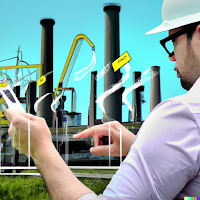
Tuesday, January 10, 2023
Instrumentation Engineer: Next steps for Professional Development
There are a variety of certification courses that an instrumentation engineer can take to improve their career. Here are a few options:
- Certified Control Systems Technician (CCST) - offered by the ISA (International Society of Automation) - This certification demonstrates an individual's knowledge and understanding of the principles of control systems and the ability to apply that knowledge in the workplace.
- Professional Engineer (PE) - offered by the National Council of Examiners for Engineering and Surveying (NCEES) - This certification demonstrates an individual's knowledge and understanding of the principles of engineering, and the ability to apply that knowledge in the workplace.
- Certified Measurement & Control Technician (CMCT) - offered by ISA - This certification demonstrates an individual's knowledge and understanding of measurement and control systems, as well as the ability to apply that knowledge in the workplace.
- Six Sigma Green Belt or Black Belt - offered by multiple organizations - Six Sigma is a data-driven approach to improving process efficiency and quality. Green Belt and Black Belt certifications demonstrate an individual's understanding of the Six Sigma methodology and the ability to apply it in the workplace.
- Advanced Process Control Engineer (APC) - offered by the ISA - This certification demonstrates an individual's knowledge and understanding of advanced process control techniques, as well as the ability to apply that knowledge in the workplace.
It's important to note that most of this certifications require both a certain level of experience and completing a specific exam, as well as having a valid engineering degree/diploma .Additionally, you should research the certification requirements and ensure that it aligns with your career goals and the specific industry you're in or want to be in.
Read more...Career improvement ideas for Instrumentation Engineers working in Construction Companies
Are these your questions in mind??
"Navigating Your Career as an Instrumentation Engineer: Opportunities and Strategies for Success"
or
"From Construction to Control: Charting a Successful Path for Instrumentation Engineers"
or
"Career Advancement for Instrumentation Engineers: Tips, Strategies and Opportunities"
or
"Instrumentation Engineer: 10 years' experience, what's next?"
Then this post is for you.
If you're an instrumentation engineer with 10 years of experience working in a construction company, there are a few different career paths you could consider, depending on your interests and goals. Here are a few suggestions:
Transition into a role in an engineering company: You could leverage your experience working in construction to transition into a role in an engineering company, where you would be responsible for designing and implementing instrumentation systems for process control and automation.
Specialize in a specific area of instrumentation: Consider focusing your efforts on mastering a particular area of instrumentation, such as process control, advanced control systems, or industrial automation. This could help you differentiate yourself in the job market and open up new opportunities.
Project management: With your experience, you could step into a role that manage projects that are related to your domain. As you already have the experience of working in different projects and having a understanding of the construction and production process it can help you to manage projects more efficiently.
Look for roles in the construction industry: While you may be interested in transitioning out of the construction industry, there may still be opportunities for you to use your skills and experience in this field. For example, you could look for roles as an instrumentation engineer or manager in a construction company or in a position that requires experience in process control and automation.
Training and Certification: You could also consider seeking out training and certification in areas that are in demand in your field, such as industrial automation, safety systems, and energy management. This will demonstrate your commitment to professional development and will help you to stay current with the latest trends and technologies in your field.
It's important to remember that every career path will have its own set of challenges and opportunities, so it's important to do your research and carefully consider which path is the best fit for you. It may also be helpful to talk to people who are currently working in the roles you're interested in to get a better understanding of what to expect.
So for Navigating Your Career as an Instrumentation Engineer: Opportunities and Strategies for Success here are the tips:
- Understanding the different career paths available to instrumentation engineers, including roles in engineering companies, construction companies, and specialized areas such as process control and automation.
- Tips for transitioning from a construction company to an engineering company or other specialized role in the field of instrumentation.
- Strategies for developing specialized knowledge and skills in areas such as process control, industrial automation, and energy management to stand out in the job market.
- The importance of continuing education and training, and suggestions for relevant certifications and training programs.
- Case studies or profiles of successful instrumentation engineers who have navigated unique career paths in the field.
- Sharing the challenges and opportunities of being an Instrumentation Engineer
- The importance of networking and connecting with professionals in the field to learn about new opportunities and stay informed about industry trends.











%20%20,%20digital%20image.png)




